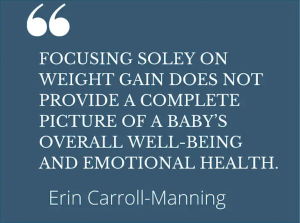Top 5 Reasons Why Newborn Weight Gain Is Not The Gold Standard
For health and development, newborn weight gain is the bare minimum!
For anyone who has experienced the whirlwind of welcoming a newborn, it’s no surprise that one of the primary conversations among medical providers revolves around the frequency of the baby’s feedings, wet diapers, and their weight gain. This focus can often lead parents to become overly vigilant, fixating on the number of ounces their little one consumes. While it’s undeniably essential to ensure that the baby is receiving adequate nutrition, this fixation may inadvertently cause parents to overlook more nuanced and significant issues that could arise once a satisfactory weight is confirmed by their medical team. The journey of caring for a newborn is not just about meeting weight milestones; it also encompasses a broader understanding of the baby’s overall well-being and development.
It is essential to note that deeper developmental aspects are often overlooked when families raise concerns. Parents may frequently hear reassurances that everything is normal, primarily because the baby is gaining weight at an appropriate rate. However, it is essential to consider various developmental milestones beyond just physical growth. This can be hard for parents when they feel they are hearing conflicting views between what their medical provider says and what either a newborn care specialist or a postpartum doula, among others.
While it’s true that your baby is healthy and will survive, that’s only part of the story. They will live and grow, but there is so much more to life than mere survival. Why, as a society, do we believe it’s acceptable to leave a newborn in survival mode without providing the support necessary for them to truly thrive?
 Weight Gain Doesn’t Always Mean Quality Feeding
Weight Gain Doesn’t Always Mean Quality Feeding
While a baby may gain weight, this doesn’t always reflect practical feeding mechanics. Issues like swallowing air, exerting too much effort, or not attempting to feed at all can play a significant role. Moreover, weight gain might occur if a baby is given a top-up bottle after breastfeeding or if exclusive pumping is used to boost milk supply. Introducing bottles or solely pumping too soon can also contribute, especially if the baby’s feeding habits and oral function haven’t been thoroughly assessed.
Several factors can impact the quality of feeding mechanics and flag potential feeding issues that need attention. For instance,
- If a baby needs to feed more frequently than every 2.5 to 3 hours
- If their daily feeds start to increase, these may be signs of challenges
- If the baby falls asleep before completing a feed or even at all
- If there are increased cluster feedings or more frequent awakenings, she/he “Just want to be held”
Takeaway’s
- Behaviors may mask underlying complications, such as oral dysfunctions, tongue ties, or airway restrictions, as well as body tensions, which could later affect a child’s speech, dental development, sleep, and digestion, physical growth and brain growth to name a few.
- A baby might be gaining weight but compensating with poor mechanics (e.g., sucking air, using excessive effort, or top up feeding with bottles).
- Growth & Development
 The scale is primarily designed to measure body weight, providing a straightforward, quantifiable result but it does not assess other vital aspects of health, such as neurological functioning, sensory abilities, or motor development.
The scale is primarily designed to measure body weight, providing a straightforward, quantifiable result but it does not assess other vital aspects of health, such as neurological functioning, sensory abilities, or motor development.
A healthy and thriving infant should also successfully integrate age-appropriate reflexes and achieve key motor milestones as well as display alertness and interactive behaviors that reflect social awareness and responsiveness. Together, these factors create a more comprehensive picture of a baby’s development, extending beyond weight gain alone.
Pediatricians evaluate certain elements during examinations, but they often play the wait and see game. This game can take weeks, months, years or even decades before performing a thorough assessment or intervening because the smaller challenges may not have reached the point where immediate action is necessary based on their medical training. A newborn who grows into adulthood without proper body alignment, function or assessment adapts and compensates over time to survive. These adaptations become increasingly challenging as one ages to reset them back to proper alignment and overall healthy functionally.
Takeaway’s:
- The scale only measures body mass, not neurological, sensory, or motor development.
- A thriving baby should also show age-appropriate reflex integration, motor milestones, and alert interaction, not just growth in ounces.
 Digestive & Nervous System Health Can Be Overlooked
Digestive & Nervous System Health Can Be Overlooked
Even though babies are gaining weight, they can also face discomfort from reflux, constipation, colic, or excessive gas. These challenges can lead to fussiness and distress, making feeding times and keeping daily routines difficult. The development of the nervous system can also be impacted, triggering responses like fight-or-flight or functional freeze. Often, these concerns don’t get the attention they need in the early stages of medical evaluation and in some cases, the repercussions of not catching issues early on can show themselves later in their development.
The symptoms mentioned may also indicate deeper issues related to the gut-brain connection and could have long-term effects if not addressed adequately, such as, leaky gut syndrome, food sensitivities, allergies, skin conditions, cognitive difficulties often described as “brain fog,” impaired nutrient absorption, vagus nerve disruptions, sleep disturbances, misdiagnosis with ADHD, and behavioral challenges, among others. Recognizing and addressing these symptoms is crucial for maintaining optimal health.
Takeaway’s:
- Tummy troubles like reflux, gas, or constipation can make babies uncomfortable and fussy, and sometimes the connection to their overall development gets missed early on.
- If left unaddressed, these issues may show up later as food sensitivities, sleep struggles, skin rashes, or even learning and behavior challenges—so spotting them early can make a big difference.
- Compensation Can Lead to Long-Term Issues
Newborns demonstrate an impressive ability to adapt and strategize when it comes to the essential task of feeding. Depending on their development skills, they’re resourceful and eager to find ways to get nourishment, although inefficient at times. This is the natural determination of their survival instincts.
Example: When hungry babies reach for a caregiver’s finger or clothing with no response, they may fuss, cry, or use sounds to communicate their needs. These behaviors showcase their problem-solving abilities as they learn to navigate their surroundings and responses from caregivers. Infants not only voice their immediate needs but also begin to grasp the dynamics of communication and relationship-building; therefore, meeting their basic needs and naturally setting the stage for their future development and learning.
In addition, when newborns are gaining weight, their bodies can still be under stress and show up in many ways. Some babies may have trouble falling or staying asleep, resulting in disrupted sleep patterns and others might develop habits, such as breathing through their mouths instead of their noses, which can have lasting implications for oral health and respiratory function.
Lastly, physical stress may also lead to poor posture, musculoskeletal issues, or behavioral changes such as irritability, anxiety, or trouble focusing. These interconnected issues underscore the importance of a holistic approach by supporting infants physically, emotionally, and developmentally. By recognizing and addressing these challenges early on, caregivers can provide more effective support for their children’s overall well-being and quality of life.
Takeaway’s
- Babies are masters of compensation: they will find ways to get milk, even if inefficient. They use sounds, movements, and cues to let caregivers know when they need help with feeding and comfort.
- Just because they are “gaining” doesn’t mean their body isn’t under strain or distress. This may later manifest as sleep struggles, mouth breathing, posture issues, or even behavioral concerns.
- Thriving Requires More Than Calorie
 There are several crucial aspects that significantly contribute to a baby thriving in their overall development and well-being. One key element is maintaining calm regulation, where newborns demonstrate emotional stability and learning to self-soothe during distress (”learning” doesn’t mean left to do it alone). Healthy sleep-wake cycles are equally vital, as they allow babies to get restorative sleep, which is essential for both growth and brain development.
There are several crucial aspects that significantly contribute to a baby thriving in their overall development and well-being. One key element is maintaining calm regulation, where newborns demonstrate emotional stability and learning to self-soothe during distress (”learning” doesn’t mean left to do it alone). Healthy sleep-wake cycles are equally vital, as they allow babies to get restorative sleep, which is essential for both growth and brain development.
Another key element is the establishment of strong bonding cues between the newborn and their caregivers. These cues can include eye contact, cooing, and responsive touch which all nurture a deep emotional connection. This serves as a foundation for the newborn’s social and emotional development.
Efficient feeding is also critical and ensures they receive the necessary nutrients for optimal growth including, both breastfeeding and formula feeding with an emphasis on good latching and recognizing feeding cues to support their hunger and satiety signals.
Smooth digestion also plays a role in a newborn’s overall well-being, enabling them to effectively digest and process food, which leads to regular bowel movements and minimal discomfort. When all these elements are in place, they contribute to a holistic sense of thriving, laying a strong foundation for future growth and development.
It’s important to note that focusing solely on weight gain does not provide a complete picture of a baby’s overall well-being and emotional health. Delving deeper into whether the baby feels secure, content, and comfortable in their environment and their bodies is essential. Understanding their emotional regulation in how they express and manage their feelings also plays a pivotal role in healthy brain development and the cultivation of resilience.
By providing a balanced mix of emotional warmth and physical support during these critical stages of infancy, caregivers lay the groundwork for the child’s lifelong mental, physical, emotional, and cognitive growth and well-being.
Takeaway’s
- True thriving means: calm regulation, good sleep-wake cycles, strong bonding cues, efficient feeding, and smooth digestion.
- Newborns, infants and toddlers thrive on consistency as its superset to keep their nervous systems calm
- Weight gain alone doesn’t capture whether the baby feels safe, comfortable, and well-regulated which are essential for optimal brain wiring and resilience.
IN CONCLUSION,
Weight gain serves as a fundamental indicator of a newborn’s health, but it should be viewed as only the starting point rather than the ultimate measure of well-being. It doesn’t provide a complete picture of their overall health and development.
To truly assess how well a newborn is laying the groundwork for lifelong health and in shaping their ability to thrive, we must consider several other factors as I discussed. These include their developmental milestones, feeding patterns, the quality of interactions with caregivers, and their emotional well-being.
Attention to the child’s environment and social connections can greatly influence their development and sense of security. While monitoring weight gain is important, it is crucial to adopt a holistic approach to evaluate a newborn’s overall health and long-term developmental trajectory.
To dive a bit deeper into your babies’ health and well-being, book a consult call with Erin, the founder of Gentle Giraffes Newborn Care and The New England Intuitive Baby Whisperer, to discuss avenues you can explore to support your newborn in gaining the solid foundation they deserve.






